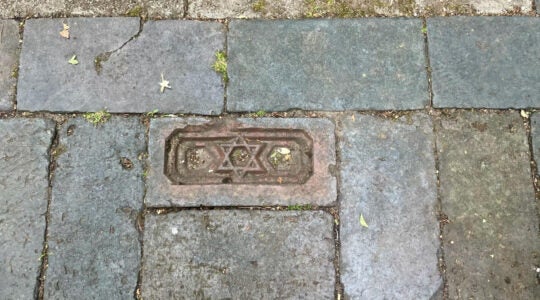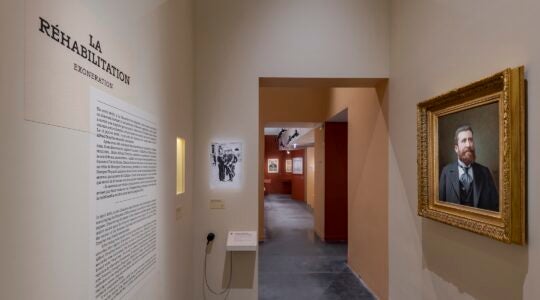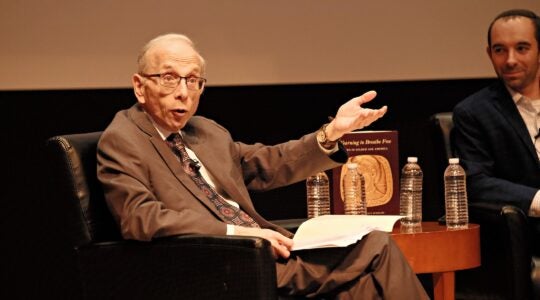Listening to participants at a daylong program at the Jewish Theological Seminary last Wednesday celebrating the first anniversary of the school’s decision to admit gay and lesbian students to its rabbinical and cantorial programs, it was clear that last year’s vote did not end the discussion. Rather, it marked the beginning of a new phase for the Conservative movement.
At the last session of the day, entitled “Adam and Eve Meet Adam and Steve: Inclusion in the Jewish Community and What Comes Next,” panelist David Shneer noted that the movement “is still in the tolerance model,” and that the community will be watching to see if and how it can progress to the “inclusion model.”
Last year’s vote was almost equally split, reflecting the fact that balancing halacha (Jewish law), which prohibits certain homosexual activity, and a 21st-century ethics of acceptance, is a particularly difficult struggle for Conservative rabbis.
Shneer illustrated that reality by noting that when he, as an openly gay Jew, moved from San Francisco to Denver several years ago to direct the Center for Judaic Studies at the University of Denver, he and his partner received their first Shabbat meal invitation “on day one” from the local Chabad rabbi.
The most hesitant invitation came from the local Conservative rabbi, he said, who at first invited only Shneer.
“I said ‘I spend Shabbat with my husband and would never invite only you to my Shabbat table,’” Shneer recalled, “so he said ‘OK, but what will I tell my kids?’”
(Shneer told his audience that young children never seem to care about these matters — only their parents do.)
Shneer said he told the rabbi to be in touch when he was more comfortable with the prospect of having him over as part of a couple.
“That was five years ago,” he said wistfully, and the invitation is yet to come.
Conservative rabbis “are very scared” about dealing with the issue of gays and lesbians, observed Shneer. He said the clergy often have empathetic impulses themselves but are concerned that their congregations won’t go along with the required openness, and they fear losing their pulpits.
His message to the audience of about three dozen, mostly students, was that “it’s important for you to push the community” toward tolerance, acceptance and inclusion, just as caring Conservative Jews advocate for kashrut or Jewish education.
He said that while many Jewish organizations and synagogues see themselves as inclusive, they are not perceived that way by gays, especially couples.
Shneer, co-editor of “Queer Jews,” is part of a major national project studying 3,700 congregations of all denominations on the basis of inclusion.
He said his personal goal was not to have people look past a gay Jew’s sexual identity and see their Jewishness, as an earlier speaker had suggested, but the opposite: “to look at a person’s gayness” and see the observant Jew he or she is.
While there are still Conservative scholars and others who do not abide by the decision to ordain gay rabbis and cantors — including the Masorti/Conservative movement in Israel (read the Jewish Week story here) and a number of synagogues in Canada — the daylong event at JTS, “Hazak Hazak V’nithazek: Celebrating Strength Through Inclusion,” was hailed by Chancellor Arnold Eisen as a time to mark “an historic change” at the seminary.
The question remains, though, as to how issues of sexual orientation will be incorporated into the curriculum — and into life at JTS, where an estimated 40 percent of students and faculty remain opposed to the policy of ordaining gay rabbis. (Indeed, some of them complained that their views were excluded on a day of inclusion; gay advocates countered that they were entitled to a day of celebration after a century of exclusion.)
Judith Hauptman, a professor of Talmud and rabbinic culture at JTS who endorses the decision, said she devoted her dvar Torah at the program last Wednesday to a close reading of the passages in Leviticus that appear to prohibit homosexual acts. She argued that they could be interpreted as banning “forced sexual relationships” rather than consensual ones.
Other presenters spoke of the importance of focusing on intimate and loving relationships rather than the narrower context of specific sexual acts, with the idea of ensuring that such relationships are positive and sacred.
Adina Lewittes, a former assistant dean of the rabbinical school at JTS, said she felt a sense of “healing” on being invited to participate at the seminary last Wednesday, “seven years and one sexual orientation” later. A mother of four who is now divorced and in a long-term relationship with a woman, she is founding rabbi of Congregation Sha’ar in Bergen County, N.J.
Rabbi Lewittes spoke movingly of how she seeks to serve her family-oriented congregants by stressing her commonality with them as a mother and Jew searching for meaning in her life, using shared ethical values to teach religious values.
“When I came out, it would have been easier to hide,” she said, but she concluded that would have taught young people that she was leading a life “inimical to Judaism.”
She said she found in her study of the Torah a message to always continue to change and grow, with the goal to “discover and honor each other’s godliness.”
Clearly, the day of celebration at JTS will not end the strife over the gay issue. But it gave comfort and strength to those who participated, and indicated that the seminary under Eisen will be moving away from the past and more openly toward diversity.
“JTS has long known that our differences make our community stronger,” the chancellor said in his remarks.
That sounds good, but the trick is to expand the parameters without losing the center — not a new challenge for Conservative Jewry.
The New York Jewish Week brings you the stories behind the headlines, keeping you connected to Jewish life in New York. Help sustain the reporting you trust by donating today.





